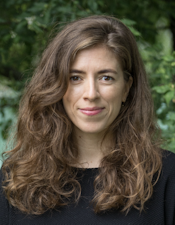The 2025 Entrepreneurship Jumpstart Academy in Nairobi
Project Update
Publish date: November 17, 2025

The 2025 Entrepreneurship Jumpstart Academy in Nairobi
Project Update
Publish date: November 17, 2025
From September 15 to 19, 2025, the bustling city of Nairobi became a hub of inspiration and innovation. Twenty-eight young changemakers, students and aspiring entrepreneurs, gathered for the Entrepreneurship Jumpstart Academy (EJA), a one-week onsite program co-led by Aiducation International and the Wyss Academy for Nature.
The aim was clear: help participants move from idea to action by building core skills in entrepreneurship, storytelling, business modeling, and financial planning—laying foundations for ventures that support livelihoods and nature.
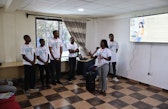
Why this Academy?
Rooted in the belief that entrepreneurship can build both livelihoods and nations, the program offers youth access to the skills, mentorship, and networks they need to start their journey.
This edition was particularly special: it marked the first collaboration between the Wyss Academy for Nature and Aiducation, uniting two networks of changemakers into one learning cohort and strengthening peer learning. In response to feedback from our Changemaker Program, the finance component was expanded to a full-day, hands-on session to deepen budgeting, key metrics, and investment readiness.
The focus aligns with our mission—enhancing youth entrepreneurship as part of building resilient livelihoods and scaling grounded insights across regions.
“The Academy was more than just a training; it was a chance to rediscover myself as an entrepreneur,” shared one participant.
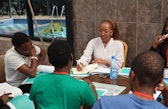
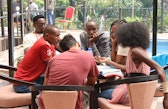
A week of learning and collaboration
Guided by a team of Kenyan and international coaches, participants worked through the essentials of entrepreneurship—from ideation and storytelling to financial planning and pitching. Coaches included Christina Reuther, Zayad A. Said, Mwanamkasi Juma, George Ogada, George Omiro, and others, combining local experience with practical instruction.
Using the Value Proposition Canvas and Business Model Canvas, teams developed and refined their business ideas, then presented them to a jury at a final pitch session that included feedback from coaches. Given that most participants had limited prior entrepreneurship experience, the step-by-step format helped turn concepts into structured cases.
“Just a few days ago, I didn’t know how to pitch an idea. Now, I can confidently share my vision with investors,” said another participant.
By the end of the week, self-assessed competence across key topics rose from 64% to 74%. Participants also highlighted “entrepreneurship and mindset,” “pitching,” and “storytelling” as particularly valuable areas of learning.
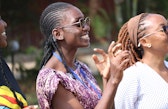

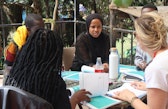
Highlights from the week
The learning extended beyond the classroom. An excursion to iHub, Nairobi’s collaborative workspace for entrepreneurs, gave participants a direct view of how ideas move toward viable ventures and expanded their contacts in the local ecosystem.
The cohort’s mix of Wyss and Aiducation participants—with different educational paths and cultural backgrounds—proved valuable. Most met one another for the first time, yet described an atmosphere of mutual understanding, curiosity, and respect, with many noting that they formed several new friendships during the week.
“We met as strangers, but left as a network of friends and collaborators,” noted one participant.
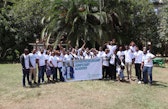
What we take forward
The Academy did what it set out to do—offer a structured, hands-on space to move from ideas to first business models and pitches, while building a supportive peer network. Feedback pointed to a gentler pace and more time with coaches, notes that will inform how we shape future workshops. The goal was not finished ventures; it was groundwork: skills, confidence, and a clearer view of the first steps toward a viable small enterprise that can support livelihoods and responsible use of local resources.
Team
- Project contactProject contact
Emine Ertugrul
Engagement Specialist
